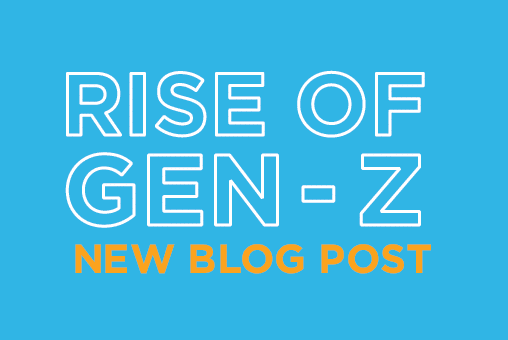
With an estimated spending power of $143 billion per year, Generation Z (aka Gen Z) accounted for approximately 40% of global consumers in 2020.1 Which got us thinking … how does this generation, future customers, consume healthcare? So we asked a Gen Zer herself, Account Coordinator Abbey Thompson.
Token Gen Zer here … I’m Abbey. My generation, Gen Z, is the generation born between 1997 and 2012, after the millennials. It is the youngest, largest and most ethnically diverse generation in American history and accounts for 27% of the US population.2
There are countless ways in which Gen Zers communicate. We’re talkers, texters, FaceTimers, Snapchatters, direct messengers and so on. This can be a good and bad thing when it comes to advertising – we are very reachable on nearly every platform, but marketers also have to compete with the constant information being pushed our way … along with our short attention spans.
It’s no surprise that we Gen Zers approach our healthcare in drastically different ways than members of the Silent Generation, baby boomers, Gen X or even Millennials. For healthcare to be more Gen Z-friendly, here are some tips.
Largely due to our accessibility to information, mental health challenges are common in Gen Z. More time spent online and on devices can contribute to loneliness and depression. Further, what we are consuming on our devices is not always a positive intake. Gen Zers are deeply affected by the turbulent state of the world. Though Gen Z is also more tuned into social and environmental causes than previous generations, many people have internalized the unrest surrounding these issues – police brutality, gun control, the pandemic and climate change, to name a few – leading to increased levels of stress and feelings of isolation. All this to say, our generation is very aware of mental health issues and it is something that affects us and those close to us.
When it comes to healthcare, Gen Zers want to receive care from people and places that understand and value mental health. We are more likely to be aware of and interested in whole-person wellness, not just physical health. We care about how a medical condition affects our nutrition, sleep, stress, etc., and we usually have questions about our treatment.4 This differs from the previous healthcare model where doctors delegated and patients listened. We are more aware of taking whatever is prescribed to us or accepting advice just because it comes from a doctor. Gen Zers want to be a part of the conversation and understand their options.
86% of consumers say authenticity is important when deciding which brand they like and support.5 Gen Zers in particular value authenticity above all else. We don’t want to support large, faceless corporations. Instead, Gen Z would rather support brands that are personable and relatable. Brands who get it. An example of this is influencer marketing and its success with our age group – we trust those who are like us and who share our values. By using influencers to reach us, you are meeting us where we are.
However, we are also highly sensitive to being mimicked and can sense fakeness from a mile away. The message doesn’t just need to be targeted to us, it needs to be authentic and feel like the brand believes and supports it. While this is especially important with social issues and controversial topics, it also has an impact in a more light-hearted way. On Twitter and TikTok for example, brands have taken to commenting on viral videos and using words and phrases that are popular with Gen Z. Speaking for my age group, it’s not impressive to us that you have an intern who understands the latest memes – because usually, by the time you roll out the post or comment, they are already “old news”. It comes across as forced and trying too hard. The replies are almost always people making fun of the account and the brand. Half-hearted efforts to relate to us are usually unsuccessful. As Alexa Dagostino wrote in her Forbes article Here Is How Gen Z Is Changing The Way We Communicate, “Many companies have tried to target this group with memes and celebrities and failed miserably when the idea backfired.”7
It is important that Gen Zers feel like they know who is taking care of them and that their providers are personable and genuine – that may be the difference between picking one provider over another.
The same article mentioned above reports that a smartphone remains the #1 device for 75% of Gen Z, who spend an average of 4 hours and 15 minutes on their phones daily.8 Many of the things that older generations would do on their computers, Gen Z is just as if not more comfortable doing on their smartphones. This means that social media and ads that are mobile-friendly are key.
For healthcare organizations, this makes it crucial to have online booking and appointments available, as well as other features like text message reminders. We also prefer providers who are digitally accessible and responsive to our questions over the phone or email. Ideally, we would prefer to have apps for scheduling, viewing medical records and paying bills.9
Most likely, someone from Gen Z wouldn’t even read this article. Our attention span is about 8 seconds. This means that every moment has to count in your marketing – we see so many and are so used to scrolling past them, that you only have a few seconds to capture our attention and hold it. This is one reason why video is so popular, as are apps like TikTok.
We are also extremely resourceful and efficient. For example, we come to our healthcare providers armed with data, information and knowledge since we have the ability to do our own research ahead of time. Additionally, we are less likely to blindly follow someone else’s opinion or advice. We want a provider who will communicate with us clearly and as straightforwardly as possible.
Gen Z is a larger, more diverse and highly-educated population than ever, and we do it all with the latest iPhone glued to our hands and toggling between different tasks on several different platforms. Instead of forcing Gen Z into a pre-designed mold of what healthcare should look like, we urge you to rethink the mold. If you can reach us where we are on our devices with a forthright, visual and authentic message, we can forge a relationship for years to come. Frederick Swanston can help you there.
Let Frederick Swanston help you connect with your target audience in unique and innovative ways – contact us here.

Abbey Thompson
The original version of this page was published at: https://frederickswanston.com/rise-of-gen-z-how-to-communicate-in-a-way-that-theyll-care/
Frederick Swanston is a full-service advertising agency with capabilities in creative, brand development, media strategy and placement, web development, interactive, direct marketing and research.
The healthcare industry has forever been altered by the COVID-19 pandemic. From providers and nurses to techs and therapists, this segment of the job market has been through unimaginable ...read more
We recently attended the 24 Annual Healthcare Marketing & Physician Strategies Summit. Here's what we took away from the sessions.Cancer In Other WordsA reminder to understand ...read more
How Frederick Swanston helped inspire Memphis to get their COVID-19 vaccine when skepticism was on the rise.The AssignmentMethodist Le Bonheur Healthcare asked FredSwan to develop ...read more
Clock into the world’s largest audience with TikTokTikTok… It’s the fastest-growing social media platform in the world, with over a billion active users. Over the ...read more